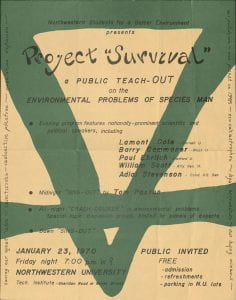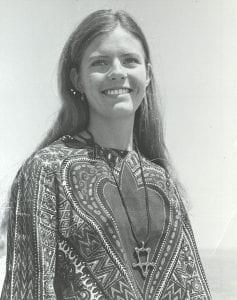Project Survival: Northwestern’s Role in the First Earth Day
Northwestern made history in 1970 when 10,000 people crowded into the Technological Institute to stay up throughout the night reflecting on the state of our environment. This teach-out, called “Project Survival”, sparked a nationwide series of environmental events as media coverage caught wind of the large-scale gathering. Teach-ins were popular tools for the anti-war movement in the late 1960s. The Northwestern students who organized Project Survival flipped this idea on its head to form the first “teach-out”, to ensure that information was shared in and beyond the traditional academic community.

Project Survival was organized by Northwestern Students for a Better Environment (NSBE), and, according to a 1970 newsletter, was intended to be a “crash course introducing people to the interlocking problems of population growth, crowding, limitation of our resources, and degradation of the environment by pollution.” Canvassers from Planned Parenthood, the League of Women Voters, the Audubon Society, and others joined with students, faculty, staff, community members, and the press to listen to speakers, participate in discussion, music, film screenings, and engage in direct action.
A Northwestern Libraries digital exhibit, “Up All Night with a Sick Environment: Project Survival and its Legacy,” explores the event and its impact on the environmental movement going forward. Ben Taylor, exhibit curator, remarked that “it was striking to me - and I wonder if it might be to current students and other people involved in a university community - to just to look at what went into that event, what their goals were and how they went about it”.
The leaders of NSBE organized over a hundred speeches and presentations during Project Survival, using a unique approach combining activism with scientific research. Taking advantage of the momentum from Project Survival, NSBE and the Northwestern Environmental Law Club spoke before a committee of the Illinois Constitutional Convention later that same year, proposing a provision to ensure a “right to a clean, healthy and enjoyable environment.” Parts of the proposal were adopted into the new 1970 Illinois Constitution, which remains in effect today. Further efforts contributed to the banning of phosphates in detergents within the City of Chicago, leading to then Mayor Richard J. Daley inviting NSBE to visit his office.
“The late Mayor Richard J. Daley was so impressed by us that he was trying to figure out a way to get us to support his candidates,” NSBE member Casey Jason told The Daily Northwestern in 1995.

According to Charla Wilson, the Archivist for the Black Experience at Northwestern, “(We) kind of have a chance to interpret what [Project Survival] means in a contemporary sense. This was over 50 years ago, but it has a lot of relevance today,” Wilson said. “So, that's part of our mission in the archives, is to get people interested in utilizing the material.”
Ben Taylor noted that many environmental groups at Northwestern still draw inspiration from Project Survival. NSBE, now known as Students for Ecological and Environmental Development (SEED), continue their work today. SEED’s mission is to pioneer, teach, and model environmental stewardship to inspire future leaders to act to protect and sustain our planet. Taylor also referenced the 2022 Generations of Environmental Justice overnight event, which focused on community-based activism as a vehicle for systematically addressing the climate crisis.
While the Northwestern community sang, listened, and learned at Project Survival over 50 years ago, many of the event’s messages still resonate today: protecting Lake Michigan, preserving our natural resources, and combating pollution in all forms. Join in community this year through environment and sustainability events hosted on campus, and keep an eye out for the upcoming activities in April hosted by sustainNU and others as part of Earth Month 2024.